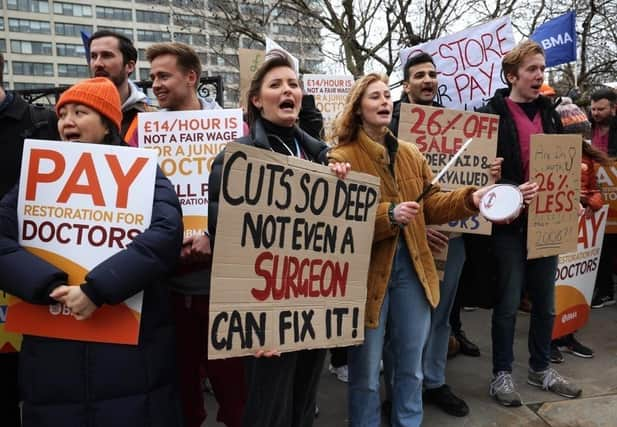The best way to mark 75 years of the NHS is to admit it has reached retirement age - John McLellan


If professionals in the top 1 per cent of earners are about to down tools along with their junior doctor colleagues, there is little doubt the system is broken. Scottish consultants have not officially decided to follow their English counterparts, but the chair of the British Medical Association’s Scottish Consultants Committee, Tayside cardiologist Alan Robertson, last week made their support clear.
“It is clear that should the Scottish Government go on deprioritising us – both in terms of pay, but also around things such as pension contribution rates, a lack of a clear plan to retain senior doctors and how they compensate us for giving up time to cover shifts during the junior doctor strike ─ then there is no doubt we will be stepping up our response accordingly,” he said.
Advertisement
Hide AdAdvertisement
Hide AdHaving been under a cardiac surgeon’s scalpel myself, I have every admiration and gratitude for their skill, but threatening to withdraw services should be a matter of shame when they earn more than most people’s wildest dreams and look forward to excellent public sector pensions while waiting lists reach record lengths.
Lothian adults wait over nine months for “routine” cardiac surgery and for routine orthopaedic surgery ─ straightforward for the surgeon, but the relief of crippling pain for the patient ─ the average wait is two and a half years. If evidence is needed for the effect of centralised state control on a key service, this is it, because the basic problems ─ lack of staff and capacity ─ are the products of an inefficient service not designed for huge growth of an ageing population.
The “free at the point of need” single service principle worked when people only lived for a couple of years after retirement, and two world wars took care of demand. But with average lifespan in Edinburgh now 82 for women and 78 for men, and medical advances expected to sustain us in ill-health, the stress on what has become a national religion is unsustainable.
There are no quick fixes, as consultants know only too well, but throwing more money at the same system will just make it more expensive and do nothing to improve the care for people waiting anxiously for life-changing treatment.
Advertisement
Hide AdAdvertisement
Hide AdWe accept that taking out insurance is necessary for our houses and cars, but the notion of health insurance and non-state provision is somehow politically beyond the pale, as SNP president Michael Russell has been reminded ever since it was included in his 2006 blueprint, “Grasping the Thistle”.
Yet every time you see your GP or dentist you visit a private practitioner, and the private sector is everywhere throughout the NHS. The NHS does not run hospices, and few complain. People are already voting with their feet, because without reform the market is already driving change.
It should not be resisted, but harnessed, but fears about a two-tier system (too late, it’s here already) means most patients joining lengthening waiting lists and becoming prisoner of the system’s inherent inefficiencies. Germany and France both have compulsory health insurance and far from the sky falling in, their outcomes are better.
The best way to mark 75 years of the NHS is to admit it has reached retirement age.
Comment Guidelines
National World encourages reader discussion on our stories. User feedback, insights and back-and-forth exchanges add a rich layer of context to reporting. Please review our Community Guidelines before commenting.
